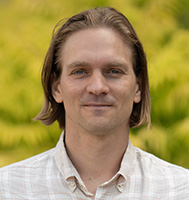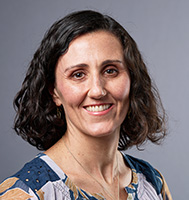Looking to master the dreaded art of first impressions and small talk? When new faculty members join the Department of Pediatrics we ask them to share their most interesting tidbits to help you sound smarter at parties. Below are some fun facts to keep in your back pocket for when the conversation hits a lull!
 “Did you know that hospitals are some of the noisiest places for patients trying to heal? Studies show that noise levels in hospitals often range from 37-88.6 dB(A), which can affect sleep, anxiety, stress levels, and even recovery time. So if you ever visit someone in the hospital, speaking softly isn’t just polite, it’s actually good medicine. 😉”
“Did you know that hospitals are some of the noisiest places for patients trying to heal? Studies show that noise levels in hospitals often range from 37-88.6 dB(A), which can affect sleep, anxiety, stress levels, and even recovery time. So if you ever visit someone in the hospital, speaking softly isn’t just polite, it’s actually good medicine. 😉”
- DeMarco Bowen, MD, MPH, assistant professor, Divisions of Hospital Medicine and Complex Care and Global Pediatrics

“Many people do not understand that hematopoietic cells are much smarter than we are. They know exactly where they want to live and what they want to become in life.”
- Michael Eckrich, MD, MPH, visiting associate professor, Division of Hematology, Oncology, Transplant, and Cellular Therapy
 “Pineapples contain an enzyme called bromelain, which can soothe an irritated throat. It breaks down mucus and reduces inflammation. So, if you have pharyngitis (and you’re not allergic), drinking pineapple juice can help you feel better faster.”
“Pineapples contain an enzyme called bromelain, which can soothe an irritated throat. It breaks down mucus and reduces inflammation. So, if you have pharyngitis (and you’re not allergic), drinking pineapple juice can help you feel better faster.”
- Hannah Wakefield, MD, MPH, assistant professor, Division of General Pediatrics and Adolescent Medicine
 “Recovery from a brain injury or stroke occurs in the setting of neuroplasticity. Neuroplasticity is the brain’s ability to reorganize itself by making new connections. This occurs early in life, and our goal in rehabilitation is to promote this neuroplasticity. In pediatric rehabilitation medicine, a multidisciplinary approach is taken with therapists who use neuroplasticity as the underlying driver of specific therapeutic techniques. This helps the brain adapt and compensate for the functions that were lost. We know that the majority of recovery from stroke or traumatic brain injury happens during the first six months after insult to the brain due to this concept, and therefore early rehabilitation is essential to recovery.”
“Recovery from a brain injury or stroke occurs in the setting of neuroplasticity. Neuroplasticity is the brain’s ability to reorganize itself by making new connections. This occurs early in life, and our goal in rehabilitation is to promote this neuroplasticity. In pediatric rehabilitation medicine, a multidisciplinary approach is taken with therapists who use neuroplasticity as the underlying driver of specific therapeutic techniques. This helps the brain adapt and compensate for the functions that were lost. We know that the majority of recovery from stroke or traumatic brain injury happens during the first six months after insult to the brain due to this concept, and therefore early rehabilitation is essential to recovery.”
- Amanda Lindenberg, DO, MOT, assistant professor, Division of Developmental Pediatrics and Rehabilitation Medicine
 “Zebrafish have an incredible regeneration potential, with the ability to lose up to 20% of their hearts and still be able to fully regenerate the entire organ.”
“Zebrafish have an incredible regeneration potential, with the ability to lose up to 20% of their hearts and still be able to fully regenerate the entire organ.”
- Jingshing Wu, MD, PhD, assistant professor, Division of Neonatology and Newborn Nursery
 “The adult brain has approximately as many neurons as there are stars in the galaxy.”
“The adult brain has approximately as many neurons as there are stars in the galaxy.”
- Austin Stuckert, MD, assistant professor, Division of Hematology, Oncology, Transplant and Cellular Therapy
 “Early ECMO equipment incorporated polyethylene tubing is typically used in the dairy and beer industries.”
“Early ECMO equipment incorporated polyethylene tubing is typically used in the dairy and beer industries.”
- Michael Smaglick, MD, assistant professor, Division of Critical Care
 “The brains of babies with some complex heart defects develop slower than the brains of babies without heart defects. A baby born on time with one of these heart defects (hypoplastic left heart syndrome and D-transposition of the great arteries) has a brain that looks and functions like a baby that was born a month premature. These early differences in brain development have both short- and long-term implications for the baby’s care and their future development.”
“The brains of babies with some complex heart defects develop slower than the brains of babies without heart defects. A baby born on time with one of these heart defects (hypoplastic left heart syndrome and D-transposition of the great arteries) has a brain that looks and functions like a baby that was born a month premature. These early differences in brain development have both short- and long-term implications for the baby’s care and their future development.”
- Jesse Boyett Anderson, MD, MS, assistant professor, Division of Cardiology
 “‘Put on your coat or you’ll catch a cold!’ Cold winter air often gets a bad rap for making people sick, but it’s not the chilly weather that’s to blame. Instead, during winter, people tend to spend more time indoors and in close quarters — such as visiting friends or attending holiday gatherings — where germs can spread more easily. It’s the indoors, not the outdoors, that are actually increasing your chances of getting sick.”
“‘Put on your coat or you’ll catch a cold!’ Cold winter air often gets a bad rap for making people sick, but it’s not the chilly weather that’s to blame. Instead, during winter, people tend to spend more time indoors and in close quarters — such as visiting friends or attending holiday gatherings — where germs can spread more easily. It’s the indoors, not the outdoors, that are actually increasing your chances of getting sick.”
- Brittany Lehrer, MD, MPH, assistant professor, Division of Infectious Diseases
 “The lungs are the largest organ to have intimate contact with the environment. The surface area of the alveolar membrane in the adult lungs is estimated to be about the size of a tennis court, and the lungs are the only organ to receive all of the blood from the right side of the heart with every heartbeat.”
“The lungs are the largest organ to have intimate contact with the environment. The surface area of the alveolar membrane in the adult lungs is estimated to be about the size of a tennis court, and the lungs are the only organ to receive all of the blood from the right side of the heart with every heartbeat.”
- Lisa Burns, MD, assistant professor, Division of Pulmonology and Sleep Medicine
 “Kangaroo care is a practice where parents hold their premature babies skin-to-skin, resembling how kangaroos carry their young. Even the smallest and most fragile infants, including those weighing as little as one pound, can benefit from this practice. It has been shown to improve bonding, regulate the baby’s temperature, and even promote faster weight gain.”
“Kangaroo care is a practice where parents hold their premature babies skin-to-skin, resembling how kangaroos carry their young. Even the smallest and most fragile infants, including those weighing as little as one pound, can benefit from this practice. It has been shown to improve bonding, regulate the baby’s temperature, and even promote faster weight gain.”
- Marisa Brant, MD, visiting associate professor, Division of Neonatology and Newborn Nursery
 “In terms of human evolution, starvation was one of the greatest threats to humanity. Our body will always try to defend itself from losing weight as protection from starvation. Hence, sustained weight loss is very difficult to achieve. The patient should not be blamed for the same mechanisms.”
“In terms of human evolution, starvation was one of the greatest threats to humanity. Our body will always try to defend itself from losing weight as protection from starvation. Hence, sustained weight loss is very difficult to achieve. The patient should not be blamed for the same mechanisms.”
- Mita Naik, MBBS, assistant professor, Division of Endocrinology and Diabetes
Want to read more? Check out the 2023 UW News article that featured several of our faculty members for more fascinating facts.